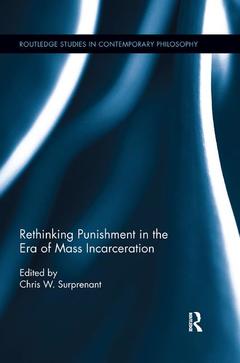Description
Rethinking Punishment in the Era of Mass Incarceration
Routledge Studies in Contemporary Philosophy Series
Coordinator: Surprenant Chris
Language: English
Subjects for Rethinking Punishment in the Era of Mass Incarceration:
Keywords
Young Man; Sentencing Guidelines; Chris W; Surprenant; Presumptive Sentencing Guidelines; Just Punishment; Civil Asset Forfeiture; John Hasnas; Parole Release Decision; Robert Hughes; Criminal Drug Laws; Andrew J; Cohen; Capital Punishment; Bill Glod; Mass Incarceration; Chris Barker; Mandatory Minimums; Jason Brennan; Pure Restitution; Michael Huemer; Involuntary Confinement; David Boonin; Restorative Justice; Bill Wringe; Restorative Justice Programs; Jay Borchert; Juvenile Convictions; Samantha Brennan; Civil Society; Joshua Dohmen; Retributive Theories; Abigail Hall Blanco; Detained Youth; John Pfaff; Geo Group; Eyal Aharoni; Missouri Model; Eddy Nahmias; Parole Board; Nathan Goodman; Denunciatory Theory; Daniel D’Amico; Private Prisons; Cara Drinan; Mitigating Factors; Briana McGinnis; RJ Practitioner; Kristen Bell; Lummi Nation; Johanna Luttrell; James Harrigan; incarceration; punishment; justice; policing; criminal justice reform; philosophy and law; political science; public policy; freedom of movement; paternalism; punishment drift; caning; restitution; retribution; compulsory victim restitution; family justice; asset forfeiture; war on drugs; apology; recidivism; youth incarceration; exile; Robert C; Hughes; Johanna C; Luttrell; Cara H; Drinan; Abigail R; Hall; Veronica J; Mercier; Andrew Cohen; William Glod; John F; Pfaff; Josh Dohmen; Daniel J; D'Amico
Publication date: 12-2019
· 15.2x22.9 cm · Paperback
Publication date: 07-2017
· 15.2x22.9 cm · Hardback
Description
/li>Contents
/li>Readership
/li>Biography
/li>
One of the most important problems faced by the United States is addressing its broken criminal justice system. This collection of essays offers a thorough examination of incarceration as a form of punishment. In addition to focusing on the philosophical aspects related to punishment, the volume?s diverse group of contributors provides additional background in criminology, economics, law, and sociology to help contextualize the philosophical issues. The first group of essays addresses whether or not our current institutions connected with punishment and incarceration are justified in a liberal society. The next set of chapters explores the negative effects of incarceration as a form of punishment, including its impact on children and families. The volume then describes how we arrived at our current situation in the United States, focusing on questions related to how we view prisons and prisoners, policing for profit, and the motivations of prosecutors in trying to secure convictions. Finally, Rethinking Punishment in the Era of Mass Incarceration examines specific policy alternatives that might offer solutions to our current approach to punishment and incarceration.
Introduction – Why do we punish?
Chris W. Surprenant
Chapter 1 – The Problem of Punishment
John Hasnas
Chapter 2 – Unconscionable Punishment
Michael Huemer
Chapter 3 – The Coproduction of Justice
Nathan Goodman
Chapter 4 – The Certainty of Punishment and the Proportionality of Incarceration
Chris Barker
Chapter 5 – Imprisonment and the Right to Freedom of Movement
Robert Hughes
Chapter 6 – Are there Expressive Restraints on Incarceration?
Bill Wringe
Chapter 7 – Punishment, Restitution, and Incarceration
David Boonin
Chapter 8 – Communicative Theories of Punishment and the Impact of Apology
Eddy Nahmias and Eyal Aharoni
Chapter 9 – A Reparative Approach to Parole-Release Decisions
Kristen Bell
Chapter 10 – Restorative Justice in High Schools: A Roadmap to Transforming Prisons
Johanna Luttrell
Chapter 11 - Reforming Youth Incarceration in the United States
Cara Drinan
Chapter 12 – Policing for "Profit": The Political Economy of Private Prisons and Asset Forfeiture
Abigail R. Hall and Veronica Mercier
Chapter 13 – Why Paternalists and Social Welfarists Should Oppose Criminal Drug Laws
Andrew Cohen and Bill Glod
Chapter 14 – The Need for Prosecutorial Guidelines
John Pfaff
Chapter 15 – Prison Tunnel Vision
Joshua Dohmen
Chapter 16 – Exile as an Alternative to Incarceration
Briana McGinnis
Chapter 17 – Corporal Punishment as an Alternative to Incarceration
Jason Brennan
Chapter 18 – The Potentials and Limits of De-Incarceration
Daniel D’Amico
Chris W. Surprenant is Associate Professor in Philosophy and Director of the Alexis de Tocqueville Project in Law, Liberty, and Morality at the University of New Orleans, USA. He is the author of Kant and the Cultivation of Virtue (Routledge 2014), co-editor of Kant and the Scottish Enlightenment (Routledge 2017) and Kant and Education: Interpretations and Commentary (Routledge 2011), and has written numerous articles on various aspects of Kant’s moral and political philosophy.




